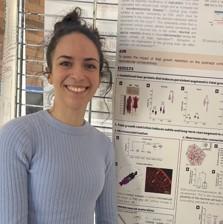Amel Amara (FLUID)
Amel Amara (FLUID)

I am pleased to invite you to my PhD thesis defense. My presentation will be in English and will be followed by a discussion in French.
I look forward to seeing many of you.
Jury members:
Martine Cohen-Salmon (CIRB, Collège de France)
Olivier Baud (Hôpitaux universitaire de Genève)
Bénédicte Dehouck (Lille Neurosciences et Cognition)
Laurent Guibaud (FLUID CRNL, Lyon 1)
Jean-François Ghersi-Egea (FLUID CRNL, Inserm)
Olivier Raineteau (SBRI, Inserm)
Abstract:
Fetal growth restriction is a significant healthcare issue commonly caused by placental insufficiency or malnutrition and characterized by a reduced brain weight and an increased risk of neurodevelopmental diseases. This thesis aims to explore the impact of fetal growth restriction induced by protein deficiency during gestation in rats, on the postnatal development of neurovascular networks and on the integrity of blood-brain barriers in both normal condition and following systemic stresses.
We first define the developmental changes in the complexity of the pyramidal cells dendritic arborization and of the vascular network. We then studied the interrelation between the dendrites and microvasculature within the cerebral cortex. We show that the neurovascular networks are resilient to protein deficiency regimen, while displaying subtle long-term characteristics suggesting an altered fetal programming.
We also provide in vivo quantitative evidence that intrauterine growth restriction induces a fragility of protective brain barriers, as well as a reduced ability of these interfaces to cope with other systemic stresses during the early postnatal period.
Finally, we observe a magnitude of effects that is variable according to individuals, thus reproducing the great variability of long-term effects observed following intrauterine growth restriction in humans. The degree of fragility of the protective barriers represents a new factor of vulnerability to the appearance of long-term neurological disorders in the context of this pathology.
CRNL | CH Le Vinatier | Bâtiment 462 Neurocampus Michel Jouvet | Amphithéâtre | 95 Boulevard Pinel | 69500 Bron











